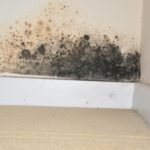National trade body the Property Care Association launches training course and qualification focused on creating a new generation of specialists with the skillset to help address the issues of damp and mould in UK housing.
As the leading representative organisation for the UK’s building protection industry, the Property Care Association has advocated for better quality ventilation to tackle excess moisture in buildings — but it says too many installations are currently hitting ‘wide of the mark.’
To address the issue, the PCA has formed an industry working group to create the Certificated Specialist in Dwelling Ventilation (CSDV) qualification, to provide a comprehensive syllabus to give a holistic approach to the subject.
 James Berry, Deputy CEO of the PCA, said: “Despite repeated efforts by various governments, their advisors, and the wider construction industry generally, condensation, mould and poor indoor air quality continues to have a negative and sometimes devastating impact on the lives of millions of people in their homes.
James Berry, Deputy CEO of the PCA, said: “Despite repeated efforts by various governments, their advisors, and the wider construction industry generally, condensation, mould and poor indoor air quality continues to have a negative and sometimes devastating impact on the lives of millions of people in their homes.
“We know that effective ventilation plays a vital part in controlling damp in homes, but at the moment installations are often carried out by well-meaning contractors who simply do not have any understanding of ventilation, or the various regulatory and guidance documents.
“As a result, too many ventilation installations are hitting wide of the mark and the inevitable outcome is damp, mould and indoor air quality issues. This has to change and in our view this approach should no longer be considered acceptable.”
The CSDV course has been developed to give building professionals the knowledge and understanding to assess the provision of ventilation in existing dwellings, as well as the ability to design systems for new builds.
It also looks ahead at the changes that will be introduced nationally as the UK moves towards more sustainable buildings, including the Government’s Future Homes Standard.
With courses starting in 2024, the potential impact of the programme is already gaining recognition, with the CSDV shortlisted in the Chartered Association of Building Engineers’ Built Environment Awards, in the Health and Wellbeing category.
James added: “More homes than ever are being affected by damp and mould and the need for suitably trained and qualified dwelling ventilation specialists is vital to address the issue.
“The situation is only going to become more significant as we gear up for the Government’s Future Homes Standard. The Standard, being introduced by 2025, will require new-build homes to be future-proofed with low carbon heating and world-leading levels of energy efficiency.
“This will include the wider impacts of Building Regulations Part L for new homes, including changes to Part F (ventilation), its associated Approved Document guidance, airtightness and improving as-built performance of the constructed home.
“It’s crucial that careful consideration is given to ventilation, to ensure the drive towards improved energy efficiency doesn’t create unintended negative consequences in the form of condensation, mould and poor indoor air quality.
“Too frequently ventilation is forgotten or is an afterthought, and the CSDV training and qualification package has one objective, to help provide healthier homes and buildings. The specialist skills developed under the programme will be key to ensuring a successful outcome.”
More details on the PCA’s CSDV training and qualification can be found at https://www.property-care.org/training-qualifications/courses/damp/specialist-in-dwelling-ventilation/17616










